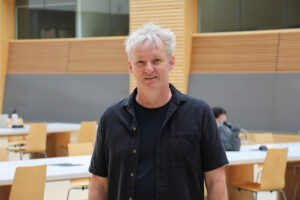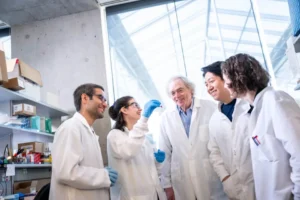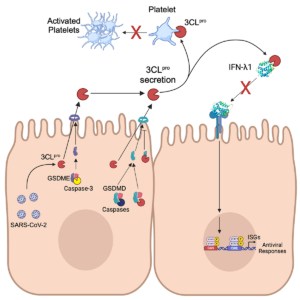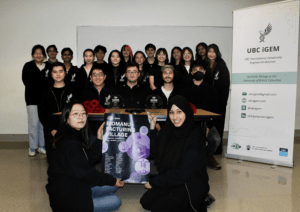Three LSI researchers named Canada Research Chairs
November 18, 2022
The Honourable François-Philippe Champagne, Minister of Innovation, Science and Industry announced an investment of more than $139 million to support 176 new and renewed Canada Research Chairs across 46 institutions in Canada.
Nineteen UBC researchers were announced as new and renewed Canada Research Chairs in the latest round of appointments, representing an investment of $19.3 million through the Canada Research Chairs program. Three of the newly named chairs are LSI researchers.
The Canada Research Chairs Program enables Canadian universities to achieve the highest levels of research excellence and become world-class research centres. Chairholders improve our depth of knowledge and quality of life, strengthen Canada's international competitiveness, and help train the next generation of highly skilled people through student supervision, teaching and the coordination of other researchers' work.
Below, each of the new Chairs responded to several questions about their research programs, and how the funding will impact their work.
Jayachandran Kizhakkedathu
Pathology and Laboratory Medicine
Tier 1 Canada Research Chair in Immunomodulation Materials and Immunotherapy

On being named a CRC:
It's exciting! I'm very happy with the recognition!
My research program is based on tailoring the molecular level interactions of synthetic polymers with biological systems to design novel biomaterials in a translational setting. We take an integrative, interdisciplinary approach combining advanced polymer synthesis with the understanding of the pathophysiology of diseases along with well-designed biological assays and animal models towards the discovery of novel polymers as therapeutics, and technologies for biomedical and clinical use.
How will the Canada Research Chair enable you to build on your existing research program?
We have been working on this direction over the last couple of years. We will have some new exciting directions to solve some challenging issues in the treatment of immunothrombosis, transplant rejection and inflammation using new molecules and materials.
What translational impacts do you aspire to achieve through this work?
We anticipate that the new molecules and materials created in this program may provide new treatment modalities for patients, and may also lead to the creation of new companies.
Jessica Rosin
Dentistry
Tier 2 Canada Research Chair in Immune Regulation of Developmental Programs
On being named a CRC:
I am very grateful to have been awarded a Tier 2 Canada Research Chair. I'm looking forward to launching into this next phase of my career with this unique opportunity to advance my research and join the amazing cohort of CRCs across Canada.
In the Rosin lab, our objective is to understand how distinct populations of immune cells, such as microglia and macrophages, signal to nearby cells during embryogenesis to contribute to the normal development of the brain and face. We employ a variety of experimental approaches to identify unique cell types and the means through which they interact with or signal to nearby cells within their surroundings. By disrupting these intricate cellular interactions during gestation using pharmacological inhibitors or environmental insults, such as stress or infection, we are able study how altering normal developmental programs impacts the fetal face, brain, and future behaviours.

How will the Canada Research Chair enable you to build on your existing research program?
The CRC funding/support will help us work on establishing the maternal periodontal infection mouse model so that we can generate preliminary data and apply for additional external funding. We will continue to look at the regulatory interplay between hypothalamic neurons and microglia, with a specific focus on the impact of maternal mental health (e.g., maternal stress) on neurodevelopmental programs. In addition to this, we will also examine the impact of maternal periodontal infection on the development of the fetal face, brain, and future behaviours, with the ultimate goal of improving prenatal care by underscoring the importance of oral health for pregnant women. In both cases, we will continue to examine why males and females often respond to maternal perturbations such as stress and infection differently during gestation.
What translational impacts do you aspire to achieve through this work?
In the case of maternal periodontal infection, we ultimately hope that our research findings are able to help improve prenatal care by underscoring the importance of oral health for pregnant women. In regards to the impact of maternal mental health on the fetus, the translational impacts of our research are hard to pinpoint because of the complexities associated with maternal mental health itself. In general, we hope that our findings can provide additional knowledge to healthcare providers and pregnant women, and our long-term goals are aimed at intervening during and/or after pregnancy to mitigate some of the disruptions that may be associated with maternal stress.
Sheila Teves
Biochemistry and Molecular Biology
Tier 2 Canada Research Chair in Transcriptional Memory and Plasticity in Stem Cells

On being named a CRC:
I’m deeply honored to be named a Canada Chair. In addition to the prestige of the award, it also felt like Canada is embracing immigrants like me with open arms. That always feels great.
In my lab, our long term goal is to understand the mechanisms governing transcriptional memory over multiple time scales. By focusing on the underlying mechanisms, we hope to generate models for how cells maintain self-identity over time, how cells change their identity over time, and how the next generation of the organism is borne from the old. These important questions touch on the cornerstone of multi-cellularity and propagation.
How will the funding enable you to build on your existing research program?
The award will allow us to fund and train new graduate students in mechanisms of transcription. It will also allow us to pursue high risk/high reward types of projects that has the potential to greatly advance how we understand stem cell biology. So in addition to training the next generation of scientists, the award could lead to significantly new advances. We are very excited with this prospect.
What translational impacts do you aspire to achieve through this work?
If there’s one thing we’ve learned from the COVID-19 pandemic and the development of mRNA vaccines, it’s that fundamental biology research can have profound impact in our society. Our work in transcription mechanisms in stem cells has the potential to inform and develop future approaches to regenerative medicine, and we are excited to pursue this goal with the Canada Chair award.
Latest News

LSI researchers awarded funding in Spring 2025 CIHR project grant competition
July 21, 2025

Jayachandran Kizhakkedathu awarded New Frontiers in Research Fund – Exploration Grant
July 14, 2025

LSI researchers awarded funding through NSERC grants
July 11, 2025

Dr. Ivan Robert Nabi awarded Distinguished Achievement award by the UBC Faculty of Medicine
June 24, 2025

Dr. Douglas Allan Receives Co-Funded Grant from Alzheimer Society and Brain Canada
June 20, 2025

LSI Researchers Receive National Recognition for Stem Cell Innovation
June 20, 2025

Dr. Mark Cembrowski awarded over $4.8 million to advance neuroscience research
June 18, 2025

Dr. Pieter Cullis profiled by CIHR for pioneering work in drug delivery and mRNA vaccines
May 29, 2025

LSI PIs Sarah Hedtrich and Arun John Peter named Canada Research Chairs
March 28, 2025

Dr. Emilia Lim Named Dr. Victor Ling Terry Fox New Investigator
February 27, 2025

Unconventional secretion of the SARS-CoV-2 main protease opens the door for new extracellular biology in viral infection
February 11, 2025

LSI researchers awarded funding in Fall 2024 CIHR Project Grant competition
January 30, 2025

UBC evolutionary ecologist and LSI PI, Dr. Kayla King, awarded Arthur B. McDonald fellowship
November 21, 2024

UBC iGEM Team Wins Top Awards for Novel DNA-Based Data Storage Platform
November 13, 2024

Congratulations to LSI PIs receiving 2024 MSHRBC Scholar Awards!
October 1, 2024